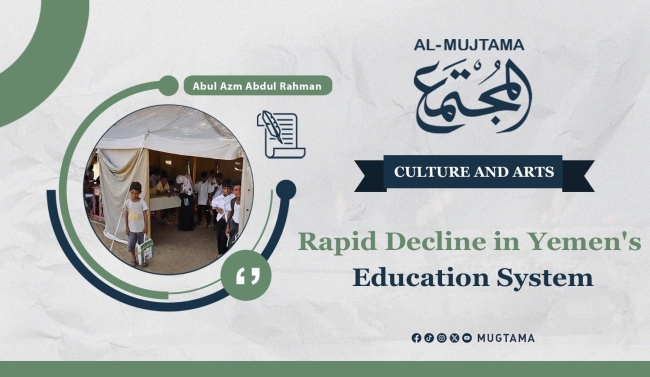Rapid Decline in Yemen's Education System
The educational process in Yemen is experiencing a severe decline and continuous deterioration. Education has been significantly impacted, affecting its various aspects in unprecedented ways due to the ongoing war for more than nine years. The education sector in Yemen is one of the largest sectors affected by the war, with the situation becoming increasingly worse. According to relevant reports, the illiteracy rate has increased by about 70% in rural areas and 40% in cities.
According to UNICEF, more than 4.5 million children in Yemen are out of school due to the repercussions of years of armed conflict in the country. The fragmentation of the already nearly collapsed educational system has had a profound impact on the learning, cognitive, and emotional development, as well as the overall mental health of the 10.6 million children in the age of school.
The situation has worsened with the division in the management of the educational process, resulting in two Ministries of Education: one under the legitimate government and the other under the Houthi group. Thousands of teachers and tens of thousands of students have been displaced from Houthi-controlled areas to government-controlled areas, particularly in Ma'rib, which is overwhelmed with displaced people, thereby doubling the burden there.
Yemeni Prime Minister in the internationally recognized legitimate government, Ahmed bin Mubarak, previously stated that the education sector in Yemen has suffered severe damage, affecting its infrastructure and educational outputs, resulting in the worst educational crisis in Yemen’s history.
In his speech at a conference organized by the Qatar's Education Above All Foundation under the slogan “Education in Danger: The Human Cost of War,” he highlighted the severe violations faced by the educational sector and children in conflicts, attended by global leaders, senior UN officials, and representatives of civil society organizations worldwide.
Bin Mubarak indicated that more than 2,860 schools have been damaged by the war, becoming unable to accommodate students due to complete or partial destruction or their use as military barracks or weapon warehouses by the Houthi group. Some schools are even used as prisons and detention centers for those opposing the group’s policies.
Political and educational analyst Abdul Wase Al-Fatky believes that after eight years of war, Yemen’s educational scene appears fragmented, as if between two educational systems of different countries. He adds that the war has significantly affected the quality of education, leading to poor educational outcomes in both government-controlled areas and Houthi-controlled areas.
Al- Fatky continues, stating that today we face two different educational systems with different goals and orientations. This is evident in the Houthis’ insistence on establishing a new educational philosophy that aligns with their ideological orientations, striving to ensure that educational outputs serve their objectives and alter the identities of students and Yemeni society.
The Yemeni political analyst continues outlining many problems that have accompanied and continue to affect the educational process in Yemen since the war, such as turning many schools into prisons, using others for sectarian indoctrination, the lack of school textbooks, and the unprecedented spread of cheating.
Due to the ongoing war in Yemen, deteriorating economic conditions, and lack of income, the country has witnessed an unprecedented dropout rate among students at all levels. Tens of thousands have left their studies to earn a living, the same reason that has driven thousands of teachers and university professors, who have been without salaries since 2016, to leave teaching and seek alternative livelihoods. These financial circumstances have forced them into difficult and modest jobs that do not match their qualifications or academic degrees.
According to a human rights report by the “American Center for Justice” titled “The Forgotten Crime,” more than 170,000 teachers in Houthi-controlled areas suffer from unpaid salaries. The report documented the killing of 1,579 teachers, 2,624 injuries, 621 arrests, 36 enforced disappearances, and 142 cases of forced displacement since September 2014.
Just as Yemen's military and civil state institutions were devastated by the war, higher education was not spared. The war and its factions have destroyed what was built over many years through curriculum updates, changes in the educational process in universities, the exclusion of staff and specialists, the looting of university revenues and allocations, among other violations and abuses.
Due to repeated tampering and continuous corruption in public and private universities and the ongoing decline in educational quality, institutions like Sana’a University, Yemen’s foremost public university, along with other Yemeni universities, were removed from the Academic Ranking of World Universities in China. This led to the complete removal of Yemen from the list, indicating that education in Yemen is no longer recognized, or at least not included in the list of international education standards.
-------------------------------------------------------------


